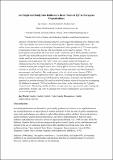| dc.contributor.author | Antony, Jiju | |
| dc.contributor.author | McDermott, Olivia | |
| dc.contributor.author | Sony, Michael | |
| dc.date.accessioned | 2021-09-20T09:18:20Z | |
| dc.date.available | 2021-09-20T09:18:20Z | |
| dc.date.issued | 2021-06-29 | |
| dc.identifier.citation | Antony, Jiju, McDermott, Olivia, & Sony, Michael. (2021). An empirical study into Ishikawa's basic tools of QC in European organisations. Paper presented at the International Scientific and Business Quality Congress:, Belgrade, Serbia, 29-30 June. | en_IE |
| dc.identifier.uri | http://hdl.handle.net/10379/16966 | |
| dc.description.abstract | The purpose of this European study is to investigate the statement of Dr Ishikawa that "95% of problems in processes can be solved using the 7 Quality Control (QC) tools". An online survey instrument was developed, disseminated, and responded to by 228 senior quality professionals from across Europe. The main finding of this study is that just 15% of participants perceived that the seven tools of QC could solve above 90% of quality problems, and 40% had utilised the incorrect tools when problem-solving. Pareto analysis was the most widely used tool across European organisations, while the least used tools are Scatter diagrams and Stratification. The 7 QC¿s tools were widely utilised in Production or Manufacturing areas but least applied in IT, Administration and Finance functions. The common benefits from using the seven basic tools of QC in all sectors include: providing structure to problem-solving efforts, aids problem solving and helps in problem definition, measurement, and analysis. This work presents a list of critical success factors (CSF¿s) required for the proper application of the 7 QC tools, including having management support, having a continuous improvement (CI) program and having a systematic and disciplined approach to problem-solving. This study is the first European research focused on investigating Dr Ishikawa's statement: "95% of problems in processes can be solved using the 7 Quality Control tools". The findings further facilitate an important first step towards understanding the applicability, benefits, and CSFs to utilising these tools in organisations across functions, sectors and globally. | en_IE |
| dc.format | application/pdf | en_IE |
| dc.language.iso | en | en_IE |
| dc.publisher | iqcongress2021 (iqcongress2021.srmek.org) | en_IE |
| dc.relation.ispartof | International Scientific & Business Quality congress | en |
| dc.rights | CC BY-NC-ND 3.0 IE | |
| dc.rights.uri | https://creativecommons.org/licenses/by-nc-nd/3.0/ie/ | |
| dc.subject | Quality | en_IE |
| dc.subject | Quality Control | en_IE |
| dc.subject | Tools | en_IE |
| dc.subject | Quality Management | en_IE |
| dc.subject | Quality Improvement | en_IE |
| dc.subject | Surveys | en_IE |
| dc.title | An empirical study into Ishikawa's basic tools of QC in European organisations | en_IE |
| dc.type | Conference Paper | en_IE |
| dc.date.updated | 2021-09-19T20:26:59Z | |
| dc.local.publishedsource | https://evrocert-my.sharepoint.com/:b:/g/personal/oliveraignjatovic_evrocert_onmicrosoft_com/EQ6hJv_bun5PrHW0YJZUKvsBngoeKymWLSUCE9ycTVwk3w?e=96TvbT | en_IE |
| dc.description.peer-reviewed | peer-reviewed | |
| dc.internal.rssid | 26667514 | |
| dc.local.contact | Olivia Mcdermott. Email: olivia.mcdermott@nuigalway.ie | |
| dc.local.copyrightchecked | Yes | |
| dc.local.version | PUBLISHED | |
| nui.item.downloads | 110 | |


